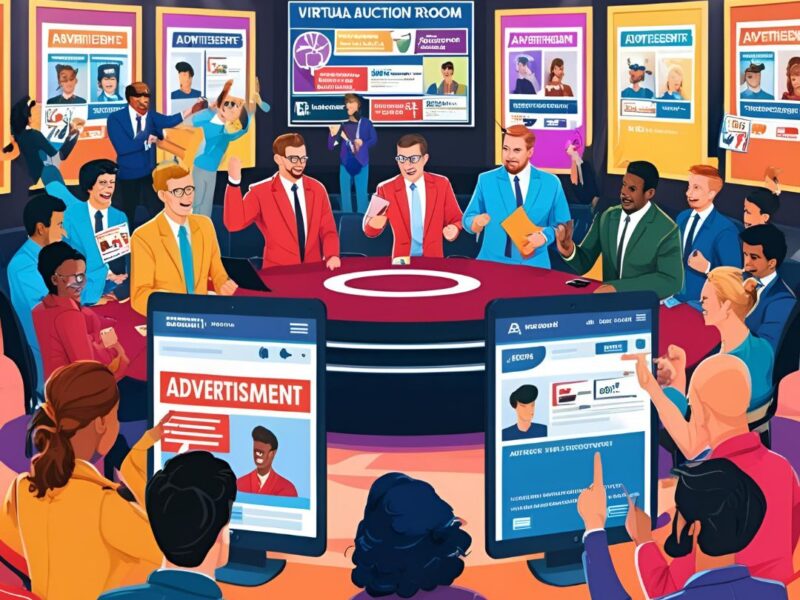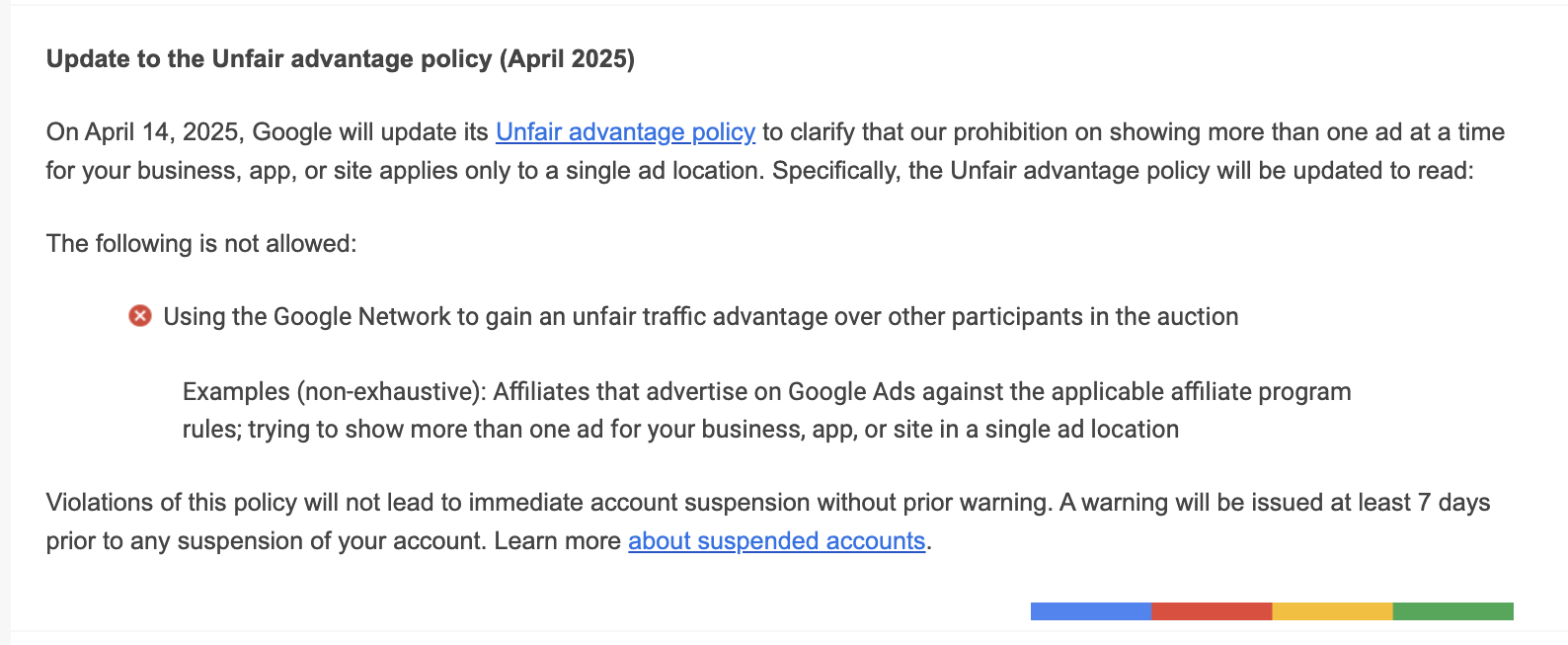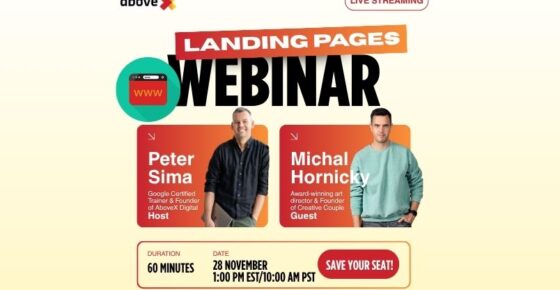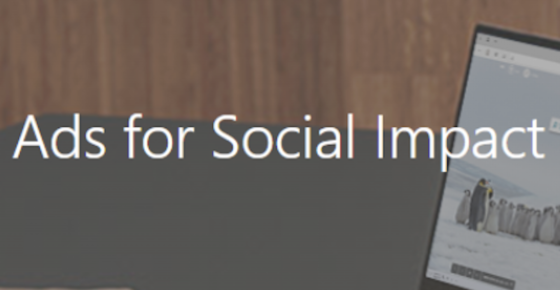
Change In Unfair Advantage Policy
How will it affect Ad Grants accounts?
Imagine you’re running a marathon, but just as you hit your stride, the rules of the race change, quietly, mid-run. That’s a bit of what it feels like for many nonprofits navigating the latest updates to Google’s Unfair Advantage Policy.
While the goal is to ensure a fair playing field in the ad auction, these new enforcement standards are stirring up questions, especially for organizations using both Google Ad Grants and paid accounts. What’s allowed? What’s not? And how can you keep your visibility without crossing the line?
In this post, we unpack what the policy actually means, what’s changing as of April 14, 2025, and how nonprofits can stay competitive.

What Does Google’s Unfair Advantage Policy Mean?
Google’s Unfair Advantage Policy is all about keeping the ad auction system balanced – making sure no advertiser manipulates visibility through unfair tactics. According to Google, practices like cloaking, duplicate content, or using multiple accounts to promote the same business in the same auction are clear violations. These techniques are seen as attempts to game the system and can result in penalties.
Until recently, Google enforced this by limiting how many times a single brand could appear in ad placements on a single page. However, starting April 14, 2025, Google is adjusting this policy. With changes to how individual ad slots are auctioned, the platform will now allow the same organization to potentially appear in multiple ad locations on a page – but only under certain conditions. This shift reflects Google’s evolving auction dynamics and introduces new complexity in how ad visibility is managed.
What’s Changed In The Unfair Advantage Policy?
Previously, the policy limited businesses from showing more than one ad per page, but the revised rule now applies that restriction only within a single ad location. This means a business can appear in multiple ad positions as long as those ads are in different sections of the page. As a result, advertisers now have increased opportunities to appear across more segments of the results page, especially if their ads are performing well.
What Does This Mean For Nonprofits?
✅ Yes, you can still use both Ad Grants and a commercial account.
For nonprofits, the core rules haven’t changed: you’re still allowed to run one Ad Grants account alongside one paid Google Ads account. The recent update doesn’t introduce new restrictions, but rather clarifies how existing policies are enforced. While Google’s evolving auction model might allow for multiple ad placements from the same business in different locations on a search page, this flexibility doesn’t currently extend to nonprofit accounts in the same way it might for commercial advertisers. Nonprofits shouldn’t expect their ads to “double serve” across placements. One ad per auction remains the standard. That said, the update serves as an important reminder to clearly distinguish the purpose and targeting of each account to stay compliant and avoid penalties.
What Will Be The Impacts On The Ecosystem?
Competition For Ad Space And Increased Costs
This recent policy update has the potential to significantly reshape the competitive landscape in Google Ads. By allowing the same brand to appear in multiple ad positions on a single results page, the change could favor advertisers with larger budgets, those able to invest in dominating multiple placements. For smaller advertisers or nonprofits working with limited resources, this shift may introduce new hurdles. Increased competition for visibility could lead to higher costs-per-click, forcing leaner teams to rethink how they allocate their budgets and prioritize campaigns. Some industry professionals even suggest that this environment might push smaller players to explore alternative channels or shift their strategy altogether, as maintaining presence in high-demand keyword spaces becomes more challenging.
Why Performance Tracking May Get Complicated
With the rollout of Google’s updated Unfair Advantage Policy, one of the biggest question marks for advertisers is how performance tracking will be affected. Since the policy now allows a single brand to appear in more than one ad slot on the same page, some experts are anticipating confusion around how metrics like impressions, clicks, and conversion attribution will be reported.
There’s concern that multiple ads from the same advertiser could lead to inflated numbers without reflecting true engagement, like a user clicking between ads from the same brand. This creates a potential for misinterpreted performance data and wasted ad spend. While the policy shift is still new, many in the PPC community are watching closely to see how reporting metrics evolve and whether measurement tools will adjust to reflect this new complexity.
Final Thoughts
As Google’s ad landscape continues to evolve, staying informed and adaptable is more important than ever, especially for nonprofits and smaller advertisers with limited resources. While the Unfair Advantage Policy update opens new doors for visibility, it also brings a wave of complexity that requires extra care in how campaigns are structured, monitored, and optimized.
For all advertisers, success under the new rules will come down to being strategic – refining keyword choices, watching performance metrics closely, and diversifying placements when needed.
Ultimately, while the policy shift may feel like a curveball, it also presents an opportunity to sharpen your strategy, test new approaches, and continue reaching your audience effectively without crossing compliance lines. Keep learning, stay agile, and you’ll be well-positioned to navigate what’s next.
Need more help navigating this change as a nonprofit? Subscribe to our newsletter or schedule a free consultation with our team!
Back to previous pageAsk our free AI chatbot.
Blog
Useful Ad Grants Tips & Tricks
Contact us directly or schedule a slot to talk to our expert team!
- AboveX Digital LLC
- 4023 Kennett Pike #50116, Wilmington, DE 19807 USA
- +1 (619) 330-9997
- Mon – Fri 9:00 am – 5:00 pm EST
- info@abovexdigital.com







